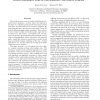Free Online Productivity Tools
i2Speak
i2Symbol
i2OCR
iTex2Img
iWeb2Print
iWeb2Shot
i2Type
iPdf2Split
iPdf2Merge
i2Bopomofo
i2Arabic
i2Style
i2Image
i2PDF
iLatex2Rtf
Sci2ools
115
click to vote
MICRO
1996
IEEE
1996
IEEE
Modulo Scheduling of Loops in Control-intensive Non-numeric Programs
Much of the previous work on modulo scheduling has targeted numeric programs, in which, often, the majority of the loops are well-behaved loop-counter-based loops without early exits. In control-intensive non-numeric programs, the loops frequently have characteristics that make it more difcult to e ectively apply modulo scheduling. These characteristics include multiple control ow paths, loops that are not based on a loop counter, and multiple exits. In these loops, the presence of unimportant paths with high resource usage or long dependence chains can penalize the important paths. A path that contains a hazard such as another nested loop can prohibit modulo scheduling of the loop. Control dependences can severely restrict the overlap of the blocks within and across iterations. This paper describes a set of methods that allow e ective modulo scheduling of loops with multiple exits. The techniques include removal of control dependences to enable speculation, extensions to modulo varia...
Related Content
| Added | 07 Aug 2010 |
| Updated | 07 Aug 2010 |
| Type | Conference |
| Year | 1996 |
| Where | MICRO |
| Authors | Daniel M. Lavery, Wen-mei W. Hwu |
Comments (0)

